By Isis Calderon
Highlight of Article:
Jasmine Wu, a student at NCCU and a dedicated climate activist, shares her experiences and insights from participating in the COP28 conference. Her journey reflects the growing importance of youth involvement in global environmental discussions. Here, we present a series of questions and Jasmine's responses, offering a glimpse into her motivations, experiences, and the lessons she learned.
1. What inspired you to become involved in climate activism and how did you secure the opportunity to volunteer at COP28?
Jasmine Wu: Discovering the impacts of my everyday choices, especially regarding animal agriculture, on the environment and animal welfare sparked my awareness of climate change. This realization, coupled with my concern for social inequalities and human rights issues, propelled me to take action. I became the Plant-Based Project leader and club president of the NCCU Green24 Sustainability Club in 2022, and later joined the Taiwan Youth Climate Coalition (TWYCC). TWYCC's role in training volunteers for COPs for over a decade enabled me to represent them at COP28, aiming to bring global insights back to Taiwan for further advocacy.
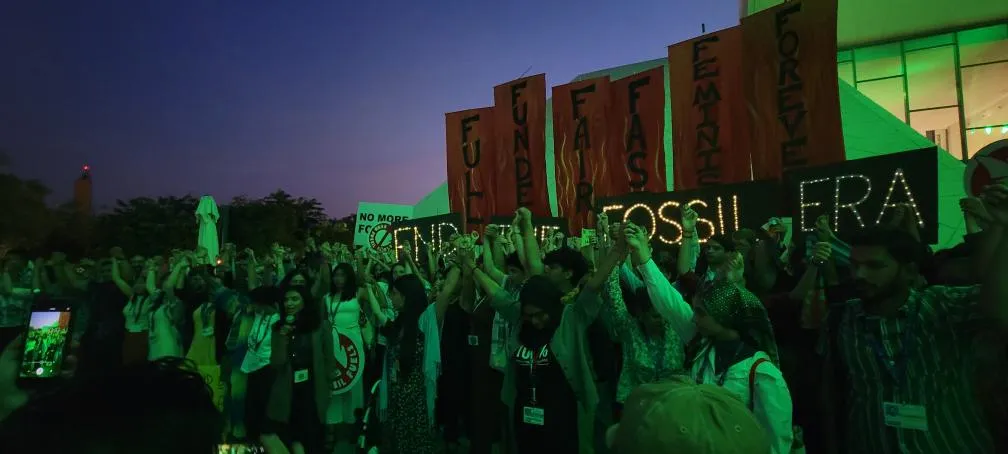
▲Youth organizes protest on the last day of COP28 to call for "phasing out fossil fuel" to be included in final negotiation text
2. What were some of the most impactful experiences or discussions you witnessed at COP28? How did these moments deepen your understanding of global climate issues?
Jasmine Wu: The most inspiring aspect at COP28 was witnessing the power of people, especially young activists' determination to be included in the policy-making process. Their passion and strategies to make a difference in climate injustices were truly motivating. Another impactful experience was understanding the importance of creativity and storytelling in climate activism. Initiatives like “ClimateLive” showed how alternative methods like music festivals can effectively spread awareness, especially in contexts where traditional forms of protest are not feasible.
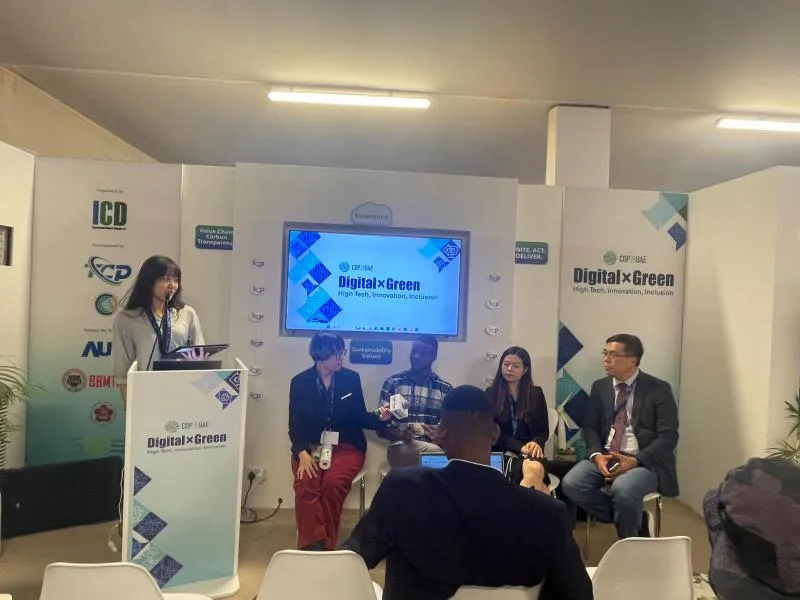
▲TWYCC cooperated with Taiwan Climate Partnership to hold an event about Intergenerational Equity and the importance of youth's voices in climate actions. Jasmine Wu served as moderator in the event.
3. Volunteering at such a significant event must come with its challenges. Could you describe a particularly challenging situation you faced at COP28 and how you managed it?
Jasmine Wu: The most challenging aspect was dealing with first-timer burnout. The intense schedule of events, negotiations, and networking, combined with processing everything simultaneously, was overwhelming. This led me to reassess my goals and expectations, emphasizing the importance of balance and self-care.
4. From your perspective as a student and climate activist, what key takeaways or lessons learned from COP28 are crucial for your peers to understand?
Jasmine Wu: Climate change is not just an environmental issue; it's intertwined with every aspect of our lives. It's crucial to find a role that aligns with your strengths in the fight against climate change. Whether you're a negotiator, artist, scientist, or lawyer, finding your flow is key to creating impact.
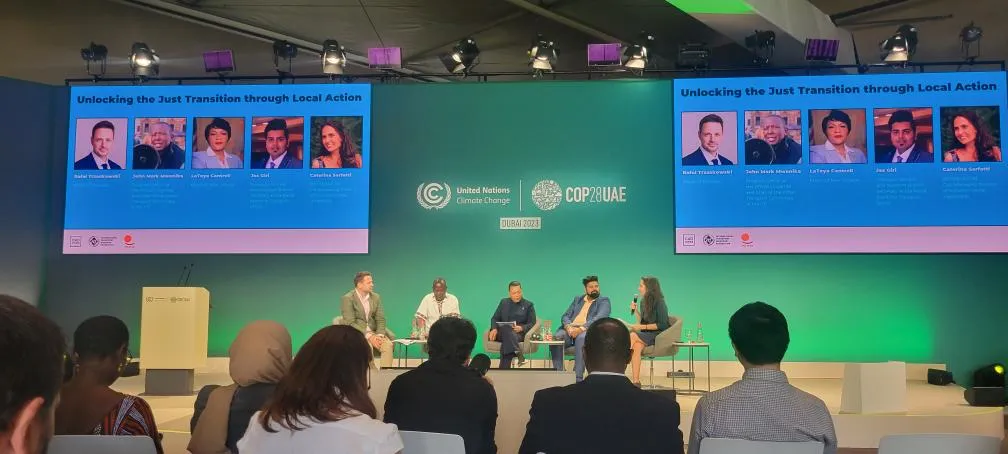
▲Attending side events at COP28 to gain insights about different topics, this one was about Just Transition in cities
5. For fellow students who are eager to contribute to climate activism but might need help knowing where to start, what advice would you give based on your experiences before, during, and after COP28?
Jasmine Wu: Before COP28, it's important to set clear goals and understand the UN and COP systems. During the conference, it's crucial to balance your schedule, leave time for flexibility and rest, and take notes for reflection. After COP28, take time to process your experiences and share them with others who might be interested in attending future COPs.
Before :
During:
After:
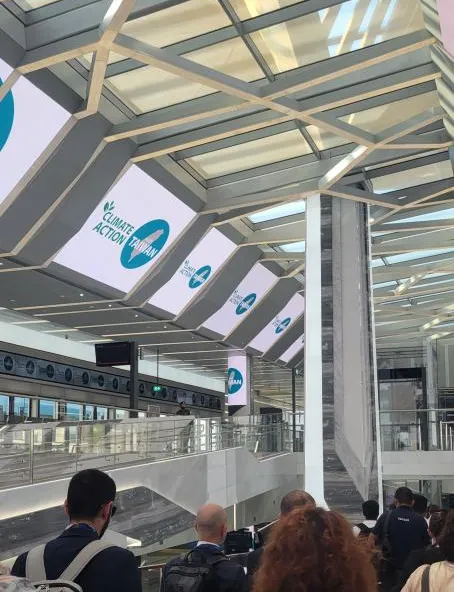
▲Taiwan's Ministry of Foreign Affairs arranged to put "Climate Action With Taiwan" in the Dubai's metro, as if telling the world that we have a presence here!
7. In your opinion as a student, how can universities foster more spaces for climate activism and education?
Jasmine Wu: Universities should proactively cooperate with established student groups fighting for climate change, like the NCCU Green24 Sustainability Club. They can support and collaborate on projects or include student climate activists in policy-making processes. Encouraging platforms that gather like-minded professors, students, and faculties to work on passionate projects is also crucial. For climate education, integrating climate change topics into various departments can be effective, like offering Eco-Literature for Linguistics or Indigenous Climate Justice Issues in Ethnicity Departments.
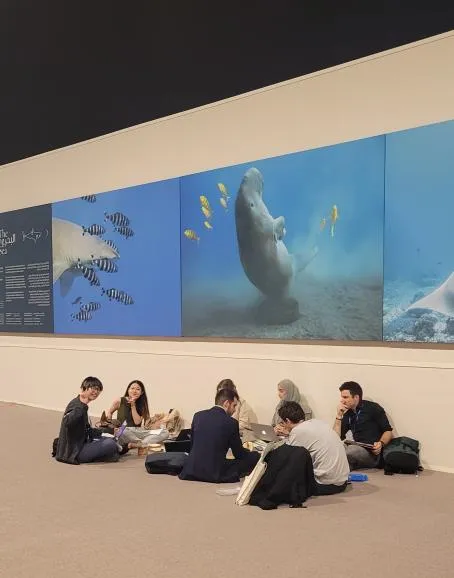
▲Youth having meetings outside the meeting rooms about the negotiation situation in regards of Just Transition topic
8. Based on your observations at COP28, how do you perceive the gap between climate policy discussions and real-world actions? What steps do you think are necessary to bridge this gap?
Jasmine Wu: Policy outcomes at COP are like setting the direction of a cruise; they are vital but vague. To effectively limit global temperature rise, every sector, civil society, and individuals must work together in a fast, just, and equitable manner.
9. What’s the importance of youth participation in high-level political discussions such as the Conference?
Jasmine Wu: Youth participation is crucial for demanding intergenerational justice. It ensures that the perspectives and demands of younger generations are heard and taken seriously in important decisions.
10. After participating in COP28, what are your next steps or goals as a climate activist? How do you plan to continue contributing to the fight against climate change?
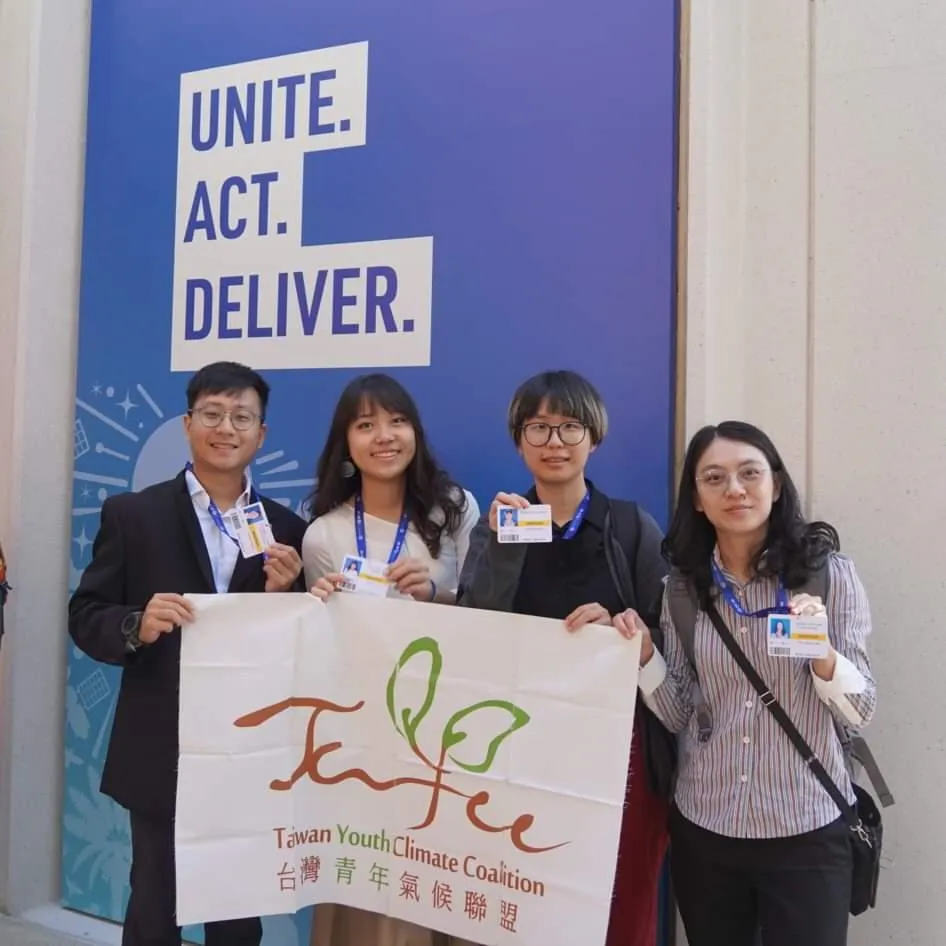
▲Taiwan Youth Climate Coalition (TWYCC) COP28 Delegates. I'm second one from the left, Yunfang is third from the left
Jasmine Wu: Inspired by COP28, I plan to continue tackling industrialized animal agriculture and promoting a plant-based lifestyle. I'm excited about our “Plant-Based Project” and the upcoming GreenFest at NCCU, which will be a vegan and plastic-free themed fair. Follow @nccugreen24 for updates and opportunities to get involved!
11. Was Taiwan represented in any other capacity at the conference? Additionally, could you share your thoughts on the significance of Taiwan's inclusion in high-level international discussions like COP28?
Jasmine Wu: Taiwan, not recognized as a country in the UN, participated as an observer at COP28. This status still allowed for meaningful engagement through observing negotiations, participating in side events, and networking. Taiwan's cooperation with diplomatic allies in these settings is crucial for forging future possibilities. Even without official recognition, we can still make our voices heard through various constituencies like “Children & Youth” at the UNFCCC.
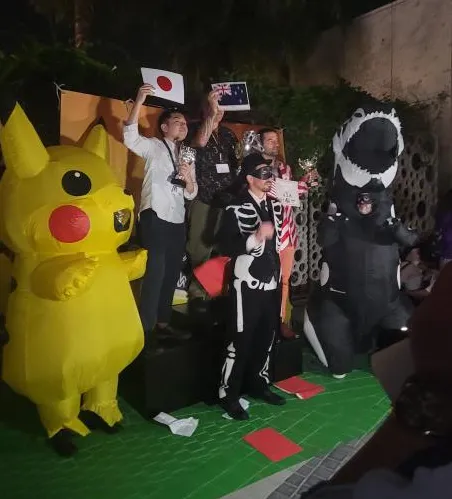
▲Satirical, creative action outside the negotiation rooms. This is called the "Fossil of the Day Award" which Climate Action Network organization gives award daily to the country who's doing the worst in climate change action.
Jasmine journey at COP28 is more than just a personal achievement; it's a reference point for student activism worldwide. Just another proof that being a student does not limit one's ability to influence global issues. Instead, it offers a unique platform for bringing fresh perspectives and innovative solutions. Students possess a blend of passion, creativity, and resilience that is essential in tackling complex challenges like climate change and it is indeed a big opportunity that we must take seriously.
Students are not just future leaders; they are change-makers here and now. In recent world events, we have noticed how young voices and actions can shape policies, influence public opinion, and drive societal change. By engaging in activism, you can develop critical thinking, leadership, and collaborative skills that are invaluable in your personal and professional life.
Jasmine's story is a call to students to recognize their potential and harness their passions for a cause they believe in. Whether it's climate change, social justice, or any other pressing issue, there is a space and a need for student activism. It's about finding what resonates with you, what stirs your spirit, and taking that first step toward making a difference.
To students at NCCU & worldwide: your voice matters, your actions count, and your involvement is crucial. Look for issues that ignite your passion, seek opportunities to learn and grow, and don't be afraid to take the lead. Remember, every big movement starts with a small step, and your journey as an activist can start today. Be inspired by stories like Jasmine's and be the change you wish to see in the world. Your engagement today shapes the world of tomorrow.
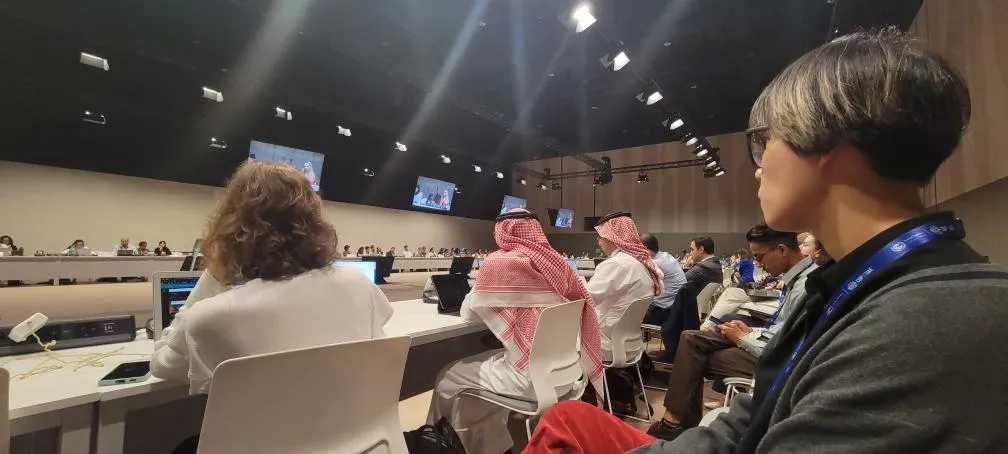
▲Inside the negotiation room
If you are interested in learning and following NCCU Green24 Sustainability Club, don’t hesitate to give them a follow on Instagram @nccugreen24!
Get involved - reach out - look for a community that makes things happen and advocate for things you believe in.
If you made it this far, thanks for reading!
More on OIC connect no.93:
A Starter Pack to the Lunar New Year
The Old and the New Religious Ways: Interview With Professor Gao Chen-Hung
NCCU at the Jessup Moot Court Taiwan Regional Competition 2024
New Student Guide: Addressing concerns adjusting to life in Taiwan
“You’re Not From Here, But Not A Tourist”: Living As A Foreign Exchange Student In Taiwan